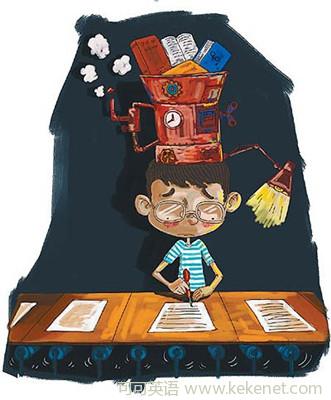
Zhang Xiao was recently given a school assignment that asked him to write an essay about his ideal job. The 10-year-old Beijing pupil responded by writing that he wanted to be the head of a large business.
"You want to be a boss, that's OK. But you shouldn't end your article like this. You should write 'I want to do charitable work with the money I earn'," his teacher commented.
Zhang's mother, Chen Chen, said she could see the point of the teacher's advice but suggested a different approach. " He's only 10. We've always instructed him to help those in need. But charity? I don't think he really understands the word at the moment.
Chen referred to her own bitter experience as a fourth-grader. She described "the weather, the attendee, who was chosen to raise the flag" and so on in a writing assignment on the topic of "Raising the flag". However, despite her honesty, Chen's essay was deemed "a very bad example".
The young girl quickly identified the difference: The other children had written sentences such as "The red flag was dyed by the blood of the martyrs," or "The flag reminds us of the sacrifice the heroes made". That kind of sentences was missing from Chen’s.
This is the unwritten rule for Chinese students: You can write what you think, but make sure it reflects your "positive thinking".
The problems are really highlighted by the gaokao, China's grueling and life-changing college entrance examination.
"The articles have always been highly stereotyped, but more so in recent years," said Qi Yongxiang, who has been an examiner for the writing exam since 1993. "There is not much diversity or originality, instead it's full of cliches. They write some beautiful sentences, but without making a point."
Nowadays, the common practice is to prepare stories about famous people, adorned with beautiful sentences, and then find a way to shoehorn them into the essay, irrespective of the actual topic.
Zhang Yikun, one of nine million students who sat this year's gaokao, really know how it works。
"The teacher at the cram school gave us a list of 50 public intellectuals," said Zhang. “The examiners must have been tired of the popular examples, so we had to give them something fresh."
The whole system really kicks in when the children start their schooling.
Zhang's mother, Song Wenli, a Chinese teacher at primary schools, said she always encourages students to express their true feelings, but students have to point out in what way you are educated and inspired. That's always the rule in China, otherwise it's hard for students to get a high score.
However, there have been changes over the years. The past 35 years have witnessed a rise in diversity of topics and a decrease in the political implications of the essays in the gaokao.
But, it's still hard for students to express themselves freely under the current education system, especially when faced with the high pressure exerted by the entrance exam, said Xiong Bingqi, vice-president of the 21st Century Education Research Institute, a non-governmental research group.
"The writing test was originally designed to display a student's independent thinking and writing skills. But now, they just try their best to cater to the examiner," said Xiong.
According to Bi Yantao, director of Center for Communication Studies, Hainan University, his son once showed him a news report about his school's sports activity, which was not really part of the school's daily routine and merely arranged for the article. The teachers taught the children how to falsify facts for the reporters.
"How can we expect the children to be sincere while the adults are liars?" asked Bi.
That question has also perplexed Chen Chen. She has always taught her son to write freely, but that means his scores have not been good.
She is now considering a compromise to ensure that he can win a place at a top-ranked middle school.
"I don't want him to be a liar. But I don't want him to be treated unfairly, either," she said.












